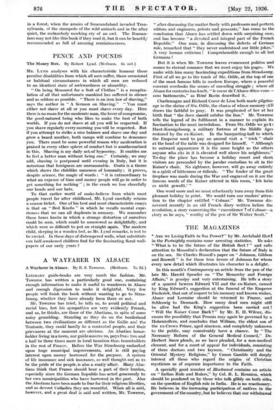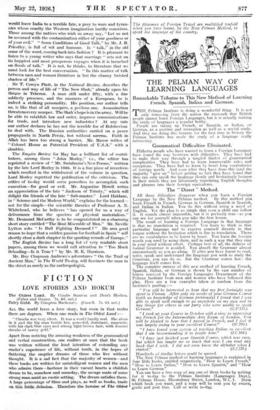THE MAGAZINES
"ARE we Losing Faith in Sea Power?" by Mr. Archibald Hurl in the Fortnightly contains some arresting statistics. He asks " What is to be the future of the British fleet ? " and calls attention to Mussolini's declaration that the future of Italy is on the sea. Sir Charles Russell's paper on Johnson, Gibbon and Boswell is for those true lovers of Johnson for whom every new detail which illustrates his character is a delight.
In this month's Contemporary an article from the pen of the late Mr. Harold Spender on " The Monarchy and Foreign Affairs," is gossipy and very entertaining. He tells a story of a quarrel beween Edward VII and the ex-Kaiser, caused by King Edward's suggestion at the funeral of the Emperor Frederick, that out of respect to his memory and known wishes, Alsace and Lorraine should be returned to France, and Schleswig to Denmark. How many dead men might still be alive had the King's suggestion been carried out ! " Will the Kaiser Come Back ? " by Mr. E. H. Wilcox, disz cusses the possibility that Prussia may again be governed by a Hohenzollern, and concludes that William, the eldest son of the ex-Crown Prince, aged nineteen, and completely unknown to the public, may conceivably have a chance. In " The Necessary Reform of the General Medical Council," Dr. Herbert Snow pleads, as we have pleaded, for a non-medical element, and for a court of appeal for- individuals, consisting of three doctors- and two laymen. " Christianity and the Oriental Mystery Religions," by Canon Gamble will deeply interest all those who regard the origins of Christian mysticism as of supreme importance to the Faith.
A specially good number of Blaeinvood contains an article on " Indian Rule and Rulers," by Col. R. L. Kennion, which should be pondered on by those who talk glibly on both sides on the question of English rule in India. He is no reactionary. He believes in the increasing participation of natives in the government of the country, but he believes that our withdrawal would leave India to a terrible fate, a prey to wars and tyran- nies whose cruelty the Western imagination hardly conceives. Those among the natives who wish us away say, " Let us not be accursed with the contamination either of your goodness or of your evil." " Some Conditions of Good Talk," by Mr. J. B. Priestley, is full of wit and humour. Is " talk," in the old sense of the word, coming back into fashion ? It is pleasant to listen to a young writer who says that marriage " sets out on its happiest and most prosperous voyages when it is launched on floods of talk." It is not, he thinks, to literature that we must look for the best conversation. " In this matter of talk between men and women literature is but the -clumsy twisted shadow of life."
I Sir T. Comyn Platt, in the National Review, describes the person and way of life of " The New Shah," already upon his thrune in Teheran. A man still under fifty, with a fine soldierly presence, and the manners of a European, he is indeed a striking personality. His position, our author tells us, is like, that of all usurpers, a perilous one. Assassination threatens every usurper. The Shah's hope is in the army- Will he be able to establish law and order, improve communications for trade, and introduce new industries ? At any rate our author declares he has not the terrible foe of Bolshevism to deal with. The Russian authorities carried on a peace propaganda in North Persia, but without success. Faith in' Allah has been too strong a barrier. Mr. Maxse writes of " Colonel House as Potential President of U.S.A." with a shudder.
The Empire Review for May has a brilliant list of contri- butors, among them " John Morley," i.e., the editor has reprinted a review of " Mr. Swinburne"s New Poems," written by the late Lord Morley in 1866. It is a fine piece of invective, which resulted in the withdrawal of the volume in question. Lord Morley regretted the publication of the criticism. The critics of to-day would seem powerless to accomplish such execution—for good or evil. Mr. Augustine Birrell writes an appreciation of the late " Jackson of Trinity," which will delight the friends of the late " Sub-master." Lord Haldane, in " Science and the Modern World," explains for the learned— not for the simple—the scientific theories of Professor A. N. Whitehead, who he believes " has opened for us a way of deliverance from the spectres of physical materialism." Mr. Desmond McCarthy is to be congratulated on a charming short story entitled " The Most Miserable of Men." Mr. Neville Lytton asks " Is Bull Fighting Doomed ? " He sees good reason to hope that a sudden passion for football in Spain " will shortly close a dark chapter in the sporting records of Europe."
The English Review has a long list of very readable short papers, among them we would call attention to " Too Much Schooling—Is it True ? " by Mr. M. E. Harrison.
Mr. Roy Chapman Andrews's adventures " On the Trail of Ancient Man," in The World To-day, will fascinate the man in the street as surely as the-anthropologist.















































 Previous page
Previous page